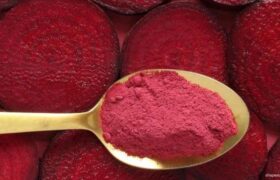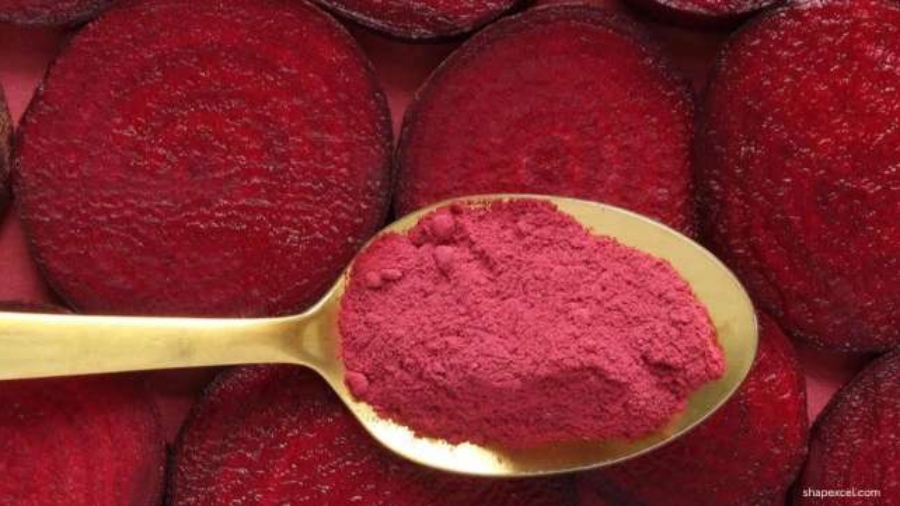Uses for Beetroot Powder That Are Divers

- Nutrient-Rich Smoothies: Smoothies that are packed with nutrients are one of the simplest methods to include beetroot powder in your diet. Make a delightful and nourishing drink by combining it with other fruits and vegetables, this will definitely help you with the increased metabolism and will provide instant energy for sure.
- Vibrant Food Coloring: Beetroot powder can be used as a natural food coloring in a variety of recipes, including cakes, pasta, and sauces, due to its vibrant red hue.
- Soups, stews, And DIY Face masks: Beetroot powder can be used to boost the flavor, color, and nutritional value of soups and stews. Since beetroot powder includes antioxidants that may be good for the skin, it can also be utilized in skincare regimens. Combine it with yogurt or honey to make a homemade face mask for a cooling treat.
Potential Sideffects of Beetroot Powder
Every coin has two sides, and everything has a darker side; hence, beetroot also has some drawbacks, which may or may not be seen in an individual. If the powder is taken incorrectly or in excess dosage, it may have multiple side effects, some of which are listed here:
- Gastrointestinal distress: Beetroot is rich in dietary fiber and natural pigments, which may cause gastrointestinal distress such as bloating, gas, or diarrhea in some individuals, especially when consumed in excessive amounts.
- Kidney stones: Oxalates, which are naturally emerging substances found in beetroot, may create kidney stones in people who are predisposed to developing them if they ingest large amounts of the vegetable over time.
- Allergic Reactions: After taking beet powder, some people who are sensitive to beets or closely similar vegetables (such as spinach or chard) may develop allergic reactions such as hives, rashes, or swelling.
- Beturia: is a neutral disease in which urine and stools may take on a red or pink hue and can be brought on by eating beetroot. This could be misinterpreted as blood in the feces or urine, but it normally isn’t a problem.
- Drug interactions and blood pressure: Beetroot is well-known for its nitrate component, which helps lower blood pressure. Consuming large amounts of beetroot powder without first seeing your doctor may result in negative side effects if you are taking blood pressure drugs.
- Iron interference: When taken in significant quantities, beetroot contains chemicals that may prevent the absorption of non-heme iron (iron acquired from plant-based sources). Particularly for people who largely rely on plant-based iron sources, this may have an impact on iron levels.
- Sugar Content: Sugar is an inherent component of beets. Even though beetroot flour may contain concentrated sugar levels, excessive use of it can still have a negative impact on diabetics’ blood sugar levels.
- Beetroot puree can have a slight laxative effect on certain people due to its fiber level, causing an increase in bowel movements.



I don’t think the title of your article matches the content lol. Just kidding, mainly because I had some doubts after reading the article.
Your article helped me a lot, is there any more related content? Thanks!
Your point of view caught my eye and was very interesting. Thanks. I have a question for you. https://www.binance.com/en/register?ref=JHQQKNKN
Thank you for your sharing. I am worried that I lack creative ideas. It is your article that makes me full of hope. Thank you. But, I have a question, can you help me?
The next time I read a weblog, I hope that it doesnt disappoint me as a lot as this one. I imply, I know it was my choice to read, however I truly thought youd have one thing interesting to say. All I hear is a bunch of whining about something that you possibly can repair in case you werent too busy searching for attention.
Can you be more specific about the content of your article? After reading it, I still have some doubts. Hope you can help me.
Pharmacological approaches augmentin safe in pregnancy Mickey mQBAgYloZkUwhDUqWe 6 19 2022
Can you be more specific about the content of your article? After reading it, I still have some doubts. Hope you can help me.
I don’t think the title of your article matches the content lol. Just kidding, mainly because I had some doubts after reading the article.
Your point of view caught my eye and was very interesting. Thanks. I have a question for you.
Thanks for sharing. I read many of your blog posts, cool, your blog is very good.
Thanks for sharing. I read many of your blog posts, cool, your blog is very good.
Your point of view caught my eye and was very interesting. Thanks. I have a question for you.
Thanks for sharing. I read many of your blog posts, cool, your blog is very good.